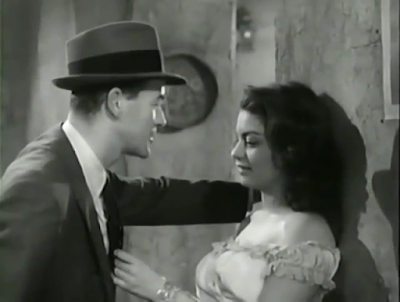(1916-1994, Cleveland, Ohio)
Tight-jawed,
anxious, lanky character actor who, as a second-tier leading man, grimaced through
noir thrillers and offbeat westerns. The moodiness and bitterness of his
cinematic loners, losers and fixers reflected Stevens’s own irascible
demeanour. Matinee looks masking a conflicted soul, he was a natural choice to
describe the jaded players of post-war thrillers.
 |
| With Lucille Ball in The Dark Corner |
After
his parents’ divorce, cared for by grandparents in England. Relocated to
Canada. Back injuries and surgery kept him out of army service. Developed a
love for acting. Bounced between menial jobs, stage plays, musicals and
broadcasting work. Returned to Chicago where he found principal roles at the
Cleveland Playhouse. A Warner Brothers contract resulted. Briefly billed as
Stephen Richards before moving to Fox, where his red hair was darkened and
freckles covered to transform him into tough-guy material.
 |
| The Lost Hours |
First
leading role in prison drama Within These
Walls, but it was his tightly wound turn in The Dark Corner that stamped his mark on shadowy thrillers. Cast as
edgy, splenetic characters, victims of fate or ordinary Joes with shifty
secrets: beat cop alongside Edmond O’Brien in Between Midnight and Dawn, played opposite Richard Widmark in The Street with No Name and was conspicuous
among a cast of sherry-drinking Brits in The
Lost Hours. Outside of hard-boiled milieus his presence worked to markedly
blander effect; overwrought mystery The
Snake Pit, where he was Olivia de Havilland’s husband, was more challenging
material. Elsewhere found regular gigs in light comedies and musicals.
 |
| Between Midnight and Dawn |
Despite
a string of lead roles, career trajectory faltered. Shrewd and ambitious, he invested
in TV series Big Town. Ratings
increased and he graduated to director/producer, forming Mark Stevens
Productions in 1955. The company’s luck ran out in 1964, making him bankrupt.
However Stevens had directed and starred in a brace of must-see noirs: in Cry Vengeance, shot in stark Alaskan
locations, he is a scar-faced ex-con bent on revenge; played another grimly
cynical character in Time Table, a
superior post-heist thriller.
 |
| With Olivia de Havilland in The Snake Pit |
Although
not physically imposing, his sullen persona changed the complexion of a number
of westerns. He worked alongside genre stars Rory Calhoun in Sand, Joel McCrea in Gunsight Ridge and Forrest Tucker in Gunsmoke in Tuscon. His foreboding
intensity in noir-western biopic Jack Slade
informed perhaps his most forceful role.
 |
| Jack Slade |
 |
| Time Table |
Television
roles followed – Zane Grey Theatre, Wagon Train, Rawhide, Kojak. Decamped
to Europe to make low-budget genre movies: uncredited in Z-grade horror La furia del hombre lobo, for example, and
locked horns with Mario Adorf in obscure Spanish western Tierra del Fuego.
 |
| With Joel McCrea in Gunsight Ridge |
Never
a man who thought highly of his talent, he was strongest as men burdened with
guilt or a crippling self-doubt, which would, on occasion, crackle ferociously
on the screen.
Stevens
saw out his last days in Europe, dying of cancer in Spain at 77.
Five standout roles
As
Brad Galt in The Dark Corner, the
archetype of the capable private eye is upended when he finds himself at the
mercy of anonymous forces. His vulnerability is encapsulated in a helpless
confession to his secretary: “I’m backed up into a dark corner and I don’t know
who’s hitting me.”
As
the titular self-loathing gunman in Jack Slade,
Stevens walks a bloody path through this noir-drenched biopic. As friends and
children die in his wake, Slade’s drunken soliloquies are some of the most fearless
scenes in the actor’s career.
As
hair-trigger ex-cop Vic Barron in Cry
Vengeance, he seeks to settle accounts. Among great supporting performances
(especially from Skip Homeir as a peroxide hitman) he still rules the roost. Most
chilling scene sees him hand a .38 slug to his intended victim’s daughter: “A
present for your daddy.”
As
bored insurance investigator turned criminal mastermind Charlie Norman in Time Table. Tijuana-bound, he attempts
to pick through the aftermath of the deadly train heist he organised. Brilliant
when his middle-class façade crumbles and his doting wife discovers he’s a
killer with a senorita south of the border.
As
outlaw Chip Coburn trying to go legit in Gunsmoke
in Tuscon, he improves a regular range-war western with a characterisation
of trademark complexity. Unlike most of his key roles, he’s afforded the
opportunity for redemption – but needs a mother lode of persuasion.
Clark Hodgkiss








No comments:
Post a Comment